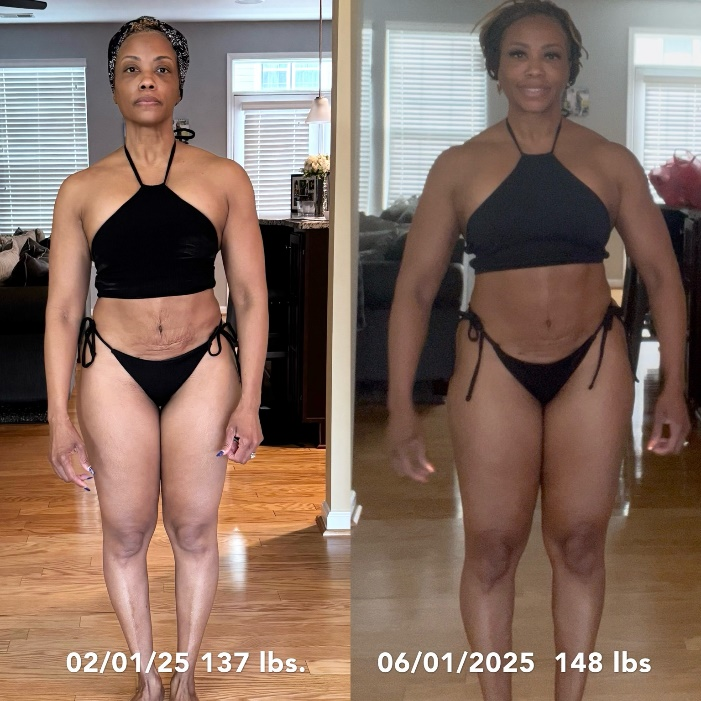
Hormonal Weight Gain in Women: Why I Gained 11 Pounds While Training Hard in 2025
In February 2025, I started a new fat-loss and muscle-building program. I was doing everything “right”—weight training 5-6 days a week, burning 500–600 calories per session, and eating clean. But the results didn’t reflect the effort.
Instead of leaning out, I gained weight. And not just a little.
February 1, 2025: 137 lbs
June 1, 2025: 148 lbs
But no matter how hard I trained, I didn’t feel strong—and I definitely didn’t look like my old self.
Was It Muscle Gain?
I’ve written before about how women naturally gain weight after lifting weights because of increased muscle mass. You can read that blog here:
“Women, You Will Gain Weight After Lifting Weights”
But this time… it felt different.
Even though I was training harder than ever, I wasn’t seeing more definition. My abdominals were disappearing. I was bloated. I felt tired. My sleep was off. My libido dropped. And mentally, I just felt flat.
So I asked myself: “What if this isn’t just about training?”
It Was My Hormones — Again
But in early 2025, I noticed my body wasn’t responding the same way it used to. I did have some labs done, but we didn’t run a full hormonal panel—so we missed key imbalances. That’s why I always recommend getting comprehensive hormone testing at the start of the year or before beginning any new training program. When your hormones are out of balance, it can block your progress no matter how hard you work.
Hormone balance isn’t one-and-done. In fact, a long-term study found that 93% of women experience a return of symptoms within one year of stopping or plateauing on Hormone Replacement Therapy (HRT). Your body’s chemistry evolves—and without regular check-ins, you can miss the moment it shifts.
Here’s what I later discovered:
- High SHBG (Sex Hormone Binding Globulin) = It was binding up my testosterone, leaving me with less usable hormone to support muscle, metabolism, and mood.
- Low Free T3 (active thyroid hormone) = My metabolism was sluggish, even with a normal TSH.
- High Estradiol + Unchecked Progesterone = Bloating, water retention, and belly fat—even though I was eating clean.
- Suppressed LH & FSH = Normal for women on HRT, but still a sign that my natural cycle wasn’t in rhythm.
These results explained everything I had been feeling:
- Fatigue
- Weight gain
- Water retention
- Low Libido
- Poor sleep
- Low energy
- Loss of muscle definition
I was pushing hard in the gym with a hormonal environment working against me.
What I Wish I Did Before Starting My 2025 Program
Before jumping into a new training program, I should have gotten a full hormone panel, not just a few basics. If you’re a woman in your 30s, 40s, or 50s feeling “off,” get your bloodwork done—and make sure it includes:
- Estradiol
- Progesterone
- Testosterone (Total & Free)
- SHBG
- Thyroid Panel (Free T3, Free T4, TSH)
- FSH / LH
- Insulin & Glucose
You’re Not Crazy. You’re Not Lazy. You Just Need Data.
If you’re lifting weights, eating right, and still gaining weight or feeling inflamed, don’t give up. Get answers. Advocate for yourself. Hormones can completely change how your body responds to training.
I’ll be getting new labs on June 16th and meeting with my doctor to fine-tune my treatment. I’m also journaling everything—from sleep and mood to symptoms and macros—and I’ll share what I learn in the next blog.
Final Takeaway
If your body isn’t responding, don’t assume it’s your fault. It might be your hormones whispering that something’s off. Listen to your body—and don’t ignore the signs.
Stay tuned for my next Blog: “Symptoms I Ignored—and Why You Shouldn’t”



